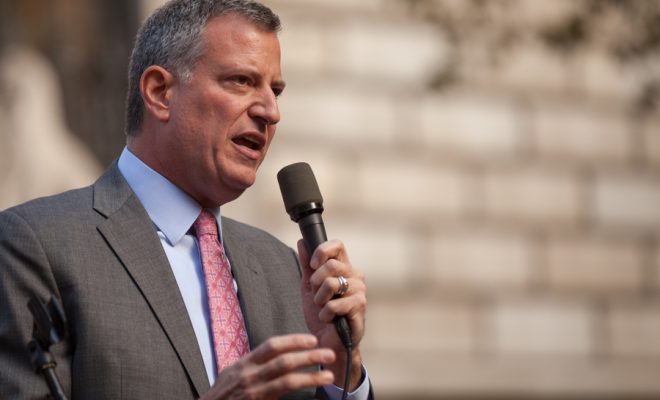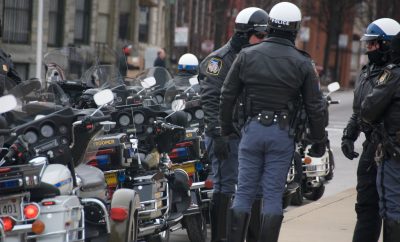 "NYC Mayor Bill de Blasio" courtesy of Kevin Case; License: (CC BY 2.0)
"NYC Mayor Bill de Blasio" courtesy of Kevin Case; License: (CC BY 2.0)
Crime
Is Bill de Blasio’s Claim that New York is the “Safest Big City” Overstated?
New York Mayor Bill de Blasio likes to repeat the claim that New York City is the “safest big city” in the United States. It’s a superlative that he frequently touts, but when you take a closer look at the underlying evidence behind this assertion, he may be overstating his case. While New York is the safest among America’s very large cities, that only holds true if you look at a particularly small group of highly populated metropolises.
This particular claim is one that Mayor de Blasio repeated last week in a statement responding to the appeals court ruling on President Trump’s executive order on immigration. Here’s the full statement:
The 9th Circuit Court of Appeals just said, ‘No you can’t,’ to the Trump Administration and its un-American travel and refugee bans. Here in New York – the safest big city in America – we will always protect our neighbors, no matter where they came from or when they got here. Those are our values.
And here’s a tweet from last June repeating the same claim:
NYC: Still the safest big city in America. pic.twitter.com/GTktjlcCqL
— Bill de Blasio (@NYCMayor) June 3, 2016
To be fair to de Blasio, there is some subjectivity when it comes to interpreting what he’s saying. Namely, there is no clear, universally accepted definition of what counts as a large city. And assuming he’s talking about population, there is no agreed upon size that makes a city large or small. At Law Street, we set a threshold of at least 200,000 residents to define large cities, but given that de Blasio is mayor of a city with about 8.5 million people, he might only be thinking of a smaller group of very large cities.
So what does the data tell us? When thinking about safety, we typically look to the FBI’s annual crime statistics, which detail the number of violent crimes known to law enforcement in various cities, states, counties, etc. This data, part of the FBI’s Uniform Crime Reporting Program, is particularly useful because it provides the same data for nearly every city in the country. To compare between multiple cities, we take the total number of violent crimes–a category that includes murder, rape, robbery, and aggravated assault–and adjust it by population to calculate a violent crime rate per 100,000 people. In 2015, the most recent full year with FBI data, New York City had a crime rate of 586 violent crimes per 100,000 people.
In order to test Mayor de Blasio’s claim, we need to look at New York in the context of other large cities. If we use the 200,000 population threshold, New York does not have the lowest violent crime rate. Only when you raise the threshold significantly–looking only at cities with populations larger 1.5 million people–does New York have the lowest crime rate.
Using the table below, you can switch between different population thresholds to see how New York’s crime rate stacks up against other cities. Each city’s murder rate per 100,000 people is also included for comparison.
As you can see, using such a narrow definition for what qualifies as a large city means including New York and just five other American cities–Phoenix, Los Angeles, Chicago, Houston, and Philadelphia. In the most narrow sense, the Mayor’s claim is accurate when you limit the scope of comparable cities, but you may also want to compare New York to other cities that may not be quite as big. Ultimately, evaluating this claim comes down to how big a city should be in order for it to be compared to the largest one in the country.








Comments